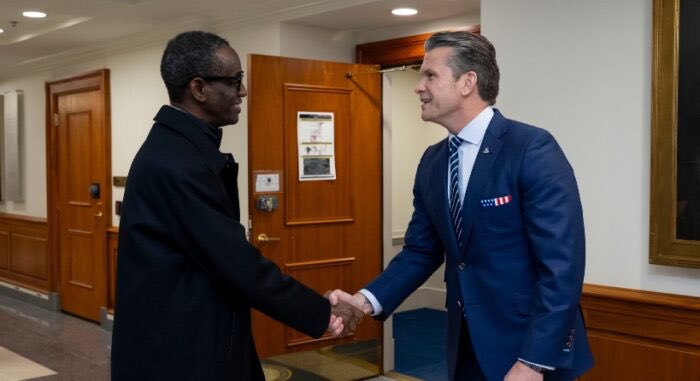- Safiu Kehinde
The Federal Government has announced reaching agreement with the United States over the spate of insecurity in the country.
This coming weeks after the US President, Donald Trump, declaration of Nigeria as a Country of Particular Concern.
Trump had also threatened to take military action against terrorists and bandits across Nigeria over the incessant attacks and killings in the country, particularly on the alleged genocidal attacks on Christians.
Sequel to the threat, President Bola Tinubu sent a high-level Nigerian delegation led by the National Security Adviser, Mallam Nuhu Ribadu, to meet with US senior officials.
After a week-long engagement between the US government’s engagement and Nigerian delegates last week, both countries come to an agreement to work in collaboration in the fight against the terrorism bedevilling the West African country.
As disclosed in a statement issued on Monday by the Special Adviser to the President on Information and Strategy, Bayo Onanuga, the delegates engaged with the senior officials across the US Congress, the White House Faith Office, the State Department, the National Security Council, and the Department of War.
Prior to the agreement in Washington, DC, the Nigerian delegation, according to Onanuga, refuted allegations of genocide in Nigeria.
They reportedly emphasised that violent attacks affect families and communities across religious and ethnic lines, warning that wrongful framing of the situation would only divide Nigerians and distort the realities on the ground.
The Presidential spokesperson disclosed the US government’s agreement to deepen ties with Nigeria in the fight against the terrorists by providing both intelligence and complementary supports to Nigeria.
“Following these engagements, the United States Government affirmed its readiness to deepen security cooperation with Nigeria.
“This includes enhanced intelligence support, expedited processing of defence equipment requests, and the potential provision of excess defence articles—subject to availability—to reinforce ongoing operations against terrorists and violent extremist groups.
“The United States also expressed its willingness to extend complementary support, including humanitarian assistance to affected populations in the Middle Belt and technical support to strengthen early-warning mechanisms.
“Both countries agreed to implement immediately a non-binding cooperation framework and to establish a Joint Working Group to ensure a unified and coordinated approach to the agreed areas of cooperation.” Onanuga wrote.
In return, the Nigerian delegation also reaffirmed the government’s commitment to strengthening civilian protection measures.
The discussions, according to Onanuga, provided ample opportunity to correct misconceptions about Nigeria, forged a constructive and solution-driven partnership with the United States.
They were also claimed to aid reinforced mutual trust, and advanced a coordinated approach to protecting vulnerable communities, especially in the Middle Belt.
Members of the delegation included Lateef Fagbemi (SAN), Attorney General of the Federation; Mr. Kayode Egbetokun, Inspector General of Police; General Olufemi Oluyede, Chief of Defence Staff; and Lt. Gen. Emmanuel Parker Undiandeye.
Others Chief of Defence Intelligence; Ms. Idayat Hassan, Special Adviser to the NSA; and Ambassador Ibrahim Babani, Director of Foreign Relations at the Office of the National Security Adviser.


